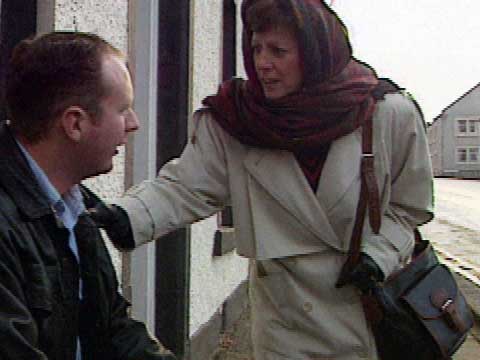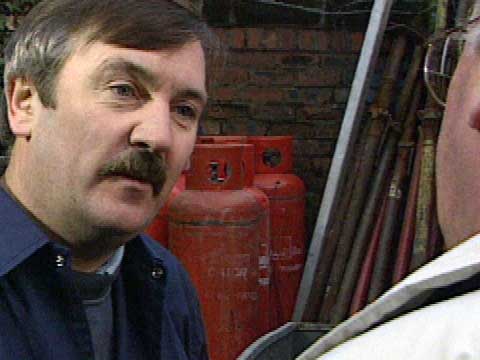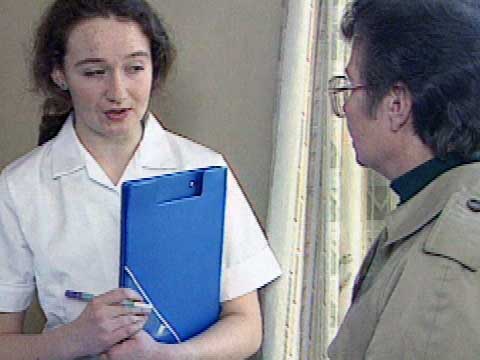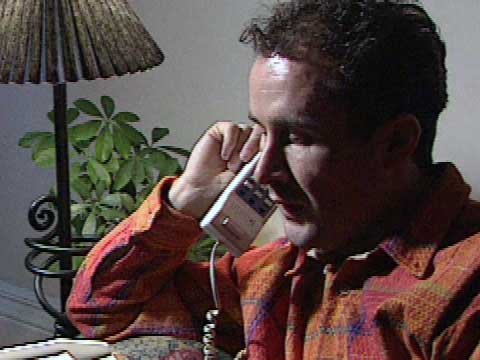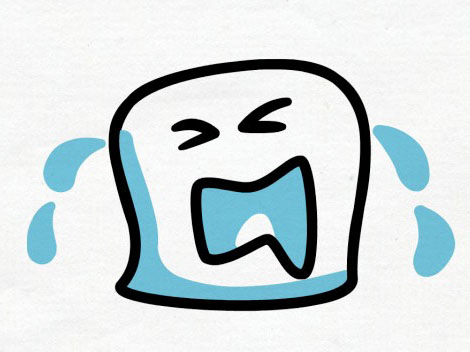Describing things that have happened A’ toirt cunntais air nithean a tha air tachairt
He's fed up telling you how he is feelingTha e air a shàrachadh ag innse dhuibh ciamar a tha e a' faireachdainn
Look out for the following pieces of vocabulary in this clip.
chan eil mi ach meadhanach I am not very well
This literally translates as ‘I am only middling’.
tha mi air mo nàrachadh I am affronted / ashamed
... gum bithinn air mo chumail a-staigh ... that I would be kept in
... gum bi mi air mo leigeil dhachaigh ... that I will be let home
... gum bi e air a chur dhachaigh ... that he will be sent home
PersonNeach
GaelicGàidhlig
EnglishBeurla
| Wife | A bheil thu a’ faireachdainn nas fheàrr an-diugh, a ghràidh? | Are you feeling better today, dear? |
| Husband | Chan eil. Chan eil mi ach meadhanach. | No. I’m not very well. |
| Wife | Obh obh. Dè tha ceàrr ort an-diugh? | Oh dear. What’s wrong with you today? |
| Husband | Chan eil mi gu math idir. Bha mi an dòchas gum bithinn air mo chumail a-staigh. Ach thuirt an dotair gum bi mi air mo leigeil dhachaigh a-màireach. | I’m not well at all. I hoped that I would be kept in. But the doctor said that I will be let home tomorrow. |
| Wife | Sin thu fhèin. Tha thu a’ fàs nas fheàrr. | There you go. You’re getting better. |
| Husband | Cha chanainn sin idir. Cha chreid mi gu bheil fhios aca dè tha iad a’ dèanamh an seo. Gu dearbh, chan eil fhios aca dè tha ceàrr orm. | I wouldn’t say that at all. I don’t think that they know what they do here. Indeed, they don’t know what’s wrong with me. |
| Wife | An do dh’innis thu dhaibh ciamar a bha thu a’ faireachdainn? | Did you tell them how you feel? |
| Husband | Tha mi air mo shàrachadh ag innse dhaibh. Ach, chan eil iad ag èisteachd. | I’m fed up telling them. But, they don’t listen. |
| Wife | Sin an nurs, tha mise a’ dol a bhruidhinn rithe. | There’s the nurse, I’m going to speak to her. |
| Husband | Glè mhath. ’S dòcha gun èist i riutsa. | Very good. Perhaps she’ll listen to you. |
| Wife | Tha an duine agam ag ràdh gum bi e air a chur dhachaigh a-màireach. | My husband says that he will be sent home tomorrow. |
| Nurse | Tha sin ceart. | That’s right. |
| Wife | Ach, tha e ag ràdh nach eil e a’ faireachdainn nas fheàrr idir. | But, he says that he doesn’t feel better at all. |
| Nurse | Tha e ceart gu leòr. | He’s quite alright. |
| Wife | Tha e ag ràdh gu bheil e air a shàrachadh ag innse dhuibh ciamar a tha e a’ faireachdainn. | He says that he’s fed up telling you how he feels. |
| Nurse | Tha mi uabhasach duilich, ach chan eil càil ceàrr air. Tha e a’ creidsinn nach eil e gu math, ach tha e cho fallainn rium fhèin no ribh fhèin. | I’m very sorry, but there’s nothing wrong with him. He thinks that he isn’t well, but he’s as healthy as me or you. |
| Wife | Dè? | What? |
| Nurse | Bidh tòrr dhaoine a’ tighinn dhan ospadal, ged a tha iad ceart gu leòr. Ach bidh iad air an cur dhachaigh, oir chan eil na leapannan againn. | Lots of people come to hospital, although they are alright. But they are sent home as we don’t have beds. |
| Wife | Tha mi air mo nàrachadh, agus bidh esan air a nàrachadh nuair a gheibh mi dhachaigh e. | I’m ashamed, and he will be ashamed when I get him home. |
